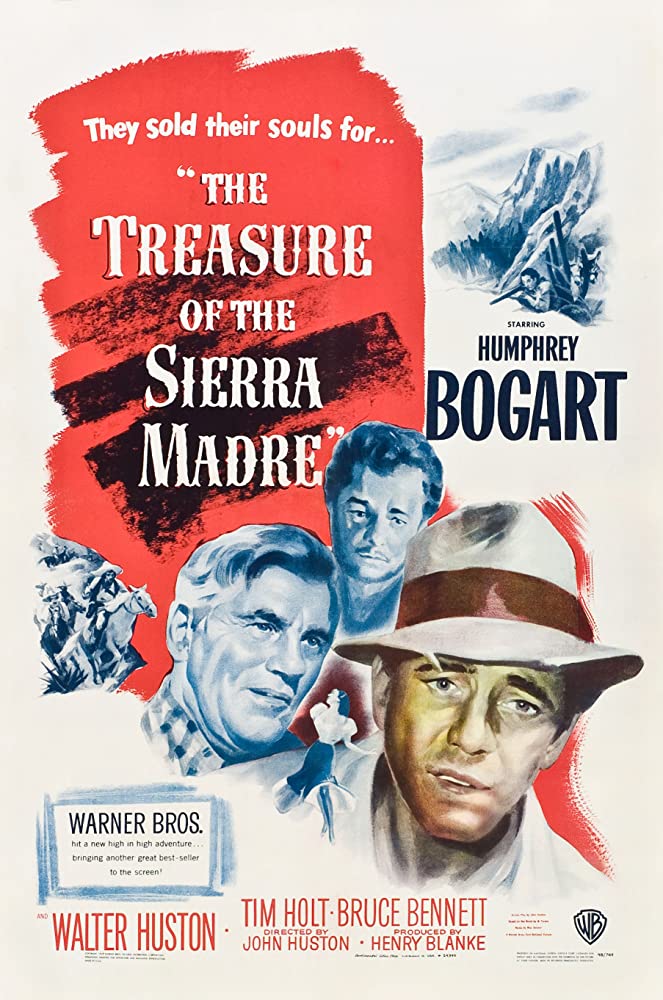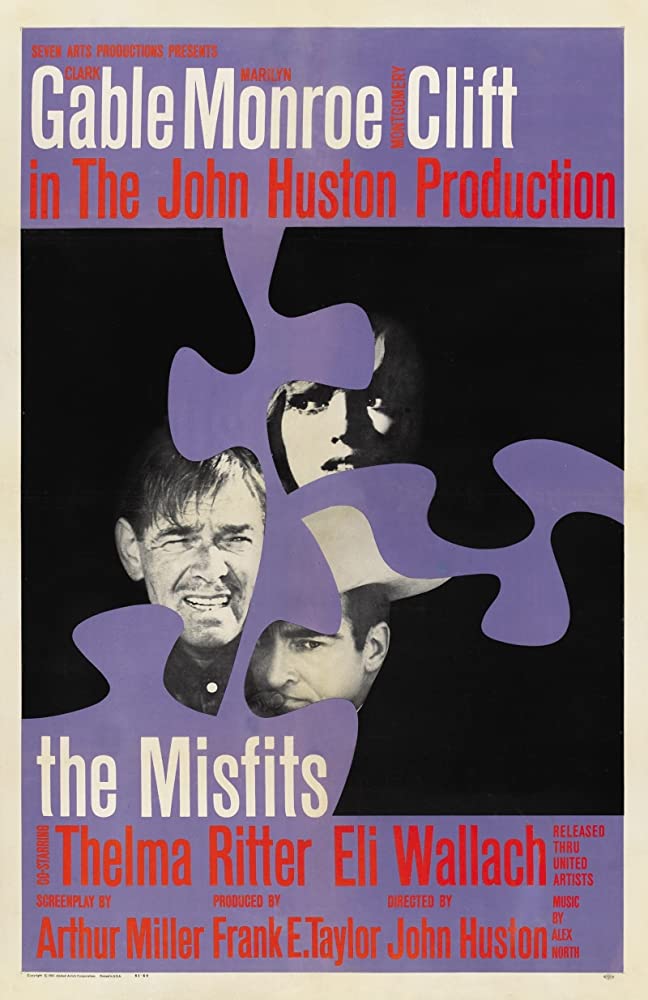
Speaking of cowboys, Isabelle Steers (Thelma Ritter) says to aging cowboy Gay Langland (Clark Gable), “I love every miserable one of you, though you’re all good for nothing, as you well know,” to which he replies, “That may be, but it’s better than wages.” That motto (“it’s better than wages”) is referred to several times in The Misfits (1961) and would, I believe, receive an affirmative response from Howard (Walter Huston), Gay’s counterpart in The Treasure of the Sierra Madre (1948). Our images of prospectors for gold and rodeo cowboys overlap on the question of wages. Both groups are composed of individuals who, though living inside the law are by no means domesticated, and do not work for wages.
The John Huston films mentioned above invite some interesting comparisons. The trio of men in each consists of an old man and two relatively young ones. The older men are respected, and each pair of young men parallels the other. But Misfits offers what Treasure is virtually devoid of…women. The only words we hear directly from a woman’s mouth ask her escort for a new pair of shoes as their speaker strolls arm in arm with swindler Pat McCormick (Barton MacLane). When the three prospectors are in the mountains, working their claim, one night before bed Howard tells his young companions they’d be better off not to even think about women. “It’s bad for your health.” A letter from a dead man’s wife pleads with her husband to make this his last trip in quest of gold, for they already have life’s greatest treasure. A woman’s words but the voice we hear is Curtin’s (Tim Holt) reading the letter aloud to Howard and Dobbs (Humphrey Bogart).

Woman makes her appearance in Misfits almost immediately, represented by Roslyn Taber (Marilyn Monroe)…beautiful, relatively young, clearly damaged…and Isabelle Steers…plain, relatively old, damaged, but at ease with, even enjoying, who she is. When asked how she got the cast on her arm, Isabelle says, “I misbehaved,” then briefly scolds herself, but without enthusiasm. Divorced, she doesn’t care about receiving alimony if the man’s “heart isn’t in it.”
Roslyn is behind the wheel of a rented car on the way to the desert home of Guido (Eli Wallach). Isabelle is riding shotgun. A bond between them is forged by the smell of sage Isabelle knows first-hand, while Roslyn came to the aroma through bottled perfume. Isabelle thinks Roslyn is too trusting and offers some advice: “Cowboys are the last real men left in the world. And they’re about as reliable as jackrabbits.” Roslyn replies, “Is anybody any different? Maybe you’re not supposed to believe what people say. Maybe it’s not even fair to them.” That observation establishes Roslyn as a mind to be reckoned with. Sixty years later those same words, in this time of pandemic disease and Donald Trump, frighten me a bit.
Her repartee with Gay when they first meet shows us The Misfits‘ Marilyn bears no resemblance whatsoever to her empty-headed secretary in Howard Hawks’s Monkey Business (1952), or her similarly lightweight kept woman in Huston’s The Asphalt Jungle (1950). Roslyn is a very different Marilyn. Damaged, yes, but not deranged, ala Don’t Bother to Knock (1952), or conniving as in Niagara (1953). The Misfit Marilyn, Roslyn, is newly divorced and reflective, then chance or fate in the form of a dog (Tom Dooley) brings an aging cowboy (“I’m a pretty good roper”) and a bit of a gigolo named Gay into her life.

Guido introduces them and later pays the bill when Gay starts to (with money from the woman he just saw off on a train? She was, you will recall, a “good sport.”) Guido stops him saying with some force, “This is mine.” Guido and Roslyn dance well together but she sees through his attempts to elicit her sympathy. She is drawn instead to Perce Howland (Montgomery Clift), the rodeo bum who hasn’t the price of an entrance fee or a bottle of whiskey to “prime” him, but he has a sensitivity absent in Guido. When Perce tells Roslyn he hates to see how life out West “chews up” women, he sounds like he means what he says. Nothing in what we see of Perce shows him to be on the make; more likely somebody on the make would figure Perce for a chump, while apart from the dancing scene, which gives Guido a pleasant whiff of the past (“I haven’t danced like this in years”), we see virtually nothing of a Guido who isn’t on the make. Perce and Guido reflect Curtin and Fred C. Dobbs like images in a pond, distorted of course, but still visible.
When Curtin and Dobbs each describe to Howard what they plan to do with their shares of the gold money we see a striking contrast. Curtin recalls having great fun picking peaches and thinking how wonderful it would be to plant things and watch them grow. The money could buy him a peach orchard. Dobbs will buy fancy clothes, “order everything on the bill of fare” at a fancy restaurant, then, “if everything isn’t just right, and maybe even if it is, I’ll bawl the waiter out and make him take it all back.” We can, I think, easily envision Perce buying a horse ranch, if not that of his dead father, while Guido would sell his house, buy a new plane, and make a thriving business out of turning wild horses into dog food. We shouldn’t forget: a dog brings Roslyn and Gay together. Had Tom Dooley not been there, how likely is it that the two men, sitting at the bar with their backs to Isabelle and Roslyn, would have seen the women in a large casino amid a lot of foot traffic? Gay certainly wasn’t looking for a woman. He wanted to go to the mountains, do “a little mustanging. Get away from people, man or woman.”

Langland has a reflective, philosophical bent that Howard does not. Perhaps his considerable experience of being alone has burned that sort of thinking out of Howard. In his future with the gold money, he sees himself owning a small store. Spending most of his time reading adventure stories and comic books. For Gay, with Roslyn the future maybe holds “a child who can be brave from the beginning.”
Gay fights a horse, wins, then has the horse set free. He tells the two men and the woman, looking as he speaks at none of them, “Damn em all. They changed it all around. Smeared it all over with blood. It’s like roping a dream now. I just got to find another way to be alive, that’s all. If there is one, anymore.”
Gay’s world no longer allows him to feel “alive” without wearing blinders. Roslyn has had enough of blinders too. “His wife was in the hospital having their baby and he’s calling me,” she says, sighing. “Me.” As they set out together, an angry, desperate, heartbroken Guido predicts Gay will soon be pumping gas or making change in a supermarket. Guido’s prediction might well prove accurate once the couple has to deal with making a living. Gay had been a cowboy, but has no other work experience we know of. His age, of course, is not on his side. Roslyn has the earning potential. It is easy to imagine her finding work as a dancer in Reno, Gay working for wages if he’s working at all.

Gay comes to realize he had been trying to rope a dream smeared in blood in response to Roslyn establishing a clear stage space between herself and the three men, then screaming, “You’re only happy when you can see something die. Why don’t you kill yourselves and be happy? You’re three dear, sweet dead men.” At Guido’s house Isabelle had scolded Gay, implied cowboys were hypocrites for claiming to love freedom yet bothering those poor mountain horses. Might we say Roslyn takes her friend’s statement to the next level?
Howard points out that gold itself isn’t good for much apart from making jewelry and filling teeth. Treasure undercuts the great life gold is believed to bring by showing Curtin, with Howard’s help, chasing his peach orchard dream while Howard returns to the people for whom he is their “whole legislature.” Fred C. Dobbs, on the other hand, loses his soul to his lust for gold. Dobbs staring into the fire after thinking he has murdered Curtin and railing to himself about conscience being silly leaves little doubt as to his fate. Gay and Roslyn follow a star over a highway towards a dream.